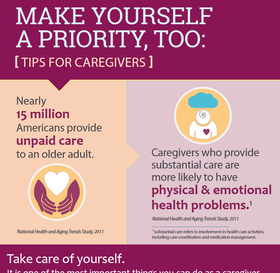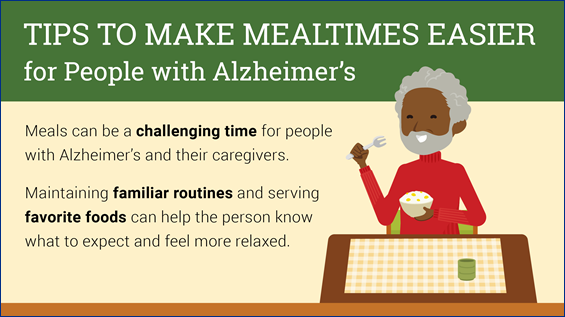|
Meals can be a challenging time for people with Alzheimer’s disease and their caregivers. However, there are steps caregivers can take to help make mealtimes successful. Consider these tips:
4 Comments
Depression is a common ailment among adults in the United States. The National Institutes of Health estimates about eight percent of adults in the country suffered from depression in 2020. Family caregivers are no exception, and may be at increased risk due to the stresses and difficulties of caregiving. Unfortunately, many caregivers experiencing depression either may not recognize the signs of depression, be ashamed to admit their “weakness,” or feel they are too busy with work and caregiving responsibilities to seek help.
For caregivers who feel they may be or are suffering from depression, exercise, a healthy diet, the support of family and friends, and consultation with a trained mental health professional may help prevent depression from getting worse over time. Click 'More Information' below for an overview of the risk factors, signs, and treatment options for depression. by Calvin Hu, Education Coordinator, Family Caregiver Alliance A four-part series, each video covers a specific disease providing need-to-know information including guidance for every stage of each disease, what to expect, financial concerns, and how to prepare for your caregiving role. Every video is also accompanied by fact sheets and essential resources guides.
Although more than 1 million women in the United States experience menopause each year, little is known about its impact on health. National Institute on Aging (NIA) -funded researchers are working to better understand menopause and how women from diverse racial and ethnic backgrounds can benefit from that scientific knowledge to live healthier lives — before, during, and after their reproductive years.
This article explores some of the topics scientists are studying, including midlife-related changes and menopause, potential treatments for symptoms, and the connection between menopause and the brain. The mistreatment of older adults can be by family members, strangers, health care providers, caregivers, or friends. Abuse can happen to any older adult, but often affects those who depend on others for help with activities of everyday life. Learn how to recognize some of the signs of elder abuse so you can step in and help. For example, you may notice that the older adult:
Older adults may be more likely to have heat-related health problems. Being hot for too long can cause hyperthermia — a heat-related illness. It is even riskier for older adults, who may be more likely to experience heat-related health problems compared to other adults. Learn how you can stay safe during hot weather with NIA’s latest infographic.
Caregivers find themselves jumping from one task to another: making breakfast, followed by helping their loved one complete their morning grooming and dressing regime, followed by a doctor’s appointment, then clearing those breakfast dishes to make room for lunch preparation.
The to-do list goes on and on. From: Senior Matters The Operation Family Caregiver (OFC) program at the Rosalynn Carter Institute for Caregivers helps create stronger, healthier, more resilient families by supporting the unsung heroes behind our heroes: the caregivers. These friends and family who take care of America’s wounded warriors do so, in many cases, at the expense of their own health and well-being. The challenges that our veterans face can affect the entire family, but services and programs rarely focus on the caregiver.
OFC provides eight free and confidential one-on-one coaching to the families, friends and supporters of those who have served our nation and returned home with either visible or invisible injuries. OFC is tailored to each caregiver’s unique needs and delivered virtually on their schedule. For more information about Operation Family Caregiver, click here. To enroll, click the button below. Our work life now includes our life’s work – caring for a family member with a chronic illness or disease or injury. How do we make room for both experiences in the workplace? How do we take time during our work day to manage our stress and worries? How do we console our colleagues who grieve?
The Caregiving Years Training Academy has come up with a free new tool to caregivers for managing caregiving, grieving and working. A Workbook for Your Workplace Wellness shares tools to help you manage your experiences as an employee, a co-worker and a family caregiver. The workbook includes a Worksheets section which features tools to use daily and weekly to manage your stress, grief and wellness. To learn more, click here. To view or download the workbook, click the button below. Use the following room-by-room checklist provided by the National Institute on Aging to alert you to potential hazards and to record any changes you need to make to help keep a person with Alzheimer’s disease safe. You can buy products or gadgets necessary for home safety at stores carrying hardware, electronics, medical supplies, and children's items.
To view the checklist, click the button below. Local Social Security offices are offering more in-person appointments and have resumed in-person service for people without an appointment.
As in-person service expands, the Social Security Administration expects its offices to become increasingly busy. The SSA strongly encourages beneficiaries seeking assistance to continue to go online, call for help, and schedule appointments in advance. The Social Security Administration has provided a fact sheet for those seeking assistance. To read the fact sheet, click the button below. Caring for an older family member often requires teamwork. While one sibling might be local and take on most of the everyday caregiving responsibilities, a long-distance caregiver can also have an important role.
As a long-distance caregiver, you can provide important respite to the primary caregiver and support to the aging family member. To learn more, click on the button below.  Caregiving can be rewarding, but difficult. Learn how you can put yourself back on the priority list. Download the entire infographic, click on the button below. Share this infographic and help spread the word about caring for yourself while caring for others. Copy and paste the URL and post it to your social media account (Twitter, Facebook, etc.). Get Alzheimer's caregiving information and advice in this comprehensive, easy-to-read guide produced by the National Institute on Aging. Learn caregiving tips, safety information, common medical problems, and how to care for yourself.
To view or download the guide, click the button below. Researchers at Weill Cornell Medicine are conducting a research study examining well-being and resource use in dementia caregivers. The aim of this study is to identify and examine the needs of caregivers and the types of resources and support services that would be most beneficial to promote well-being in caregivers. If you are eligible and agree to participate, you will be asked to complete an online survey lasting 20-30 minutes. Then, you will be given the option to participate in a follow-up phone interview with a member of our research staff. You will be asked to answer some questions about your demographic characteristics, care responsibilities, challenges experienced, and ways you have coped with those challenges. Then, you’ll be asked to answer some questions about your use of community resources, barriers to accessing and using resources, and suggestions for resources that you would be interested in using in the future based on your own personal needs. You will receive a stipend of $25 for your completed surveys. For those who choose to participate in the open-ended interview, you will be compensated with another $40. If you have any questions about this survey, please feel free to email Francesca Falzarano [email protected] or call (646)481-2858. To view the flyer for this study, click the button below. |
Caregiver
Whether in a medical professional setting or personal homes, Caregivers are caring and caring takes energy, wisdom and compassion. This Caregiver Blog is here to give you insight, encouragement and tools, not just to give care but to survive and thrive while doing it. Archives
July 2023
Categories
All
|

 RSS Feed
RSS Feed
